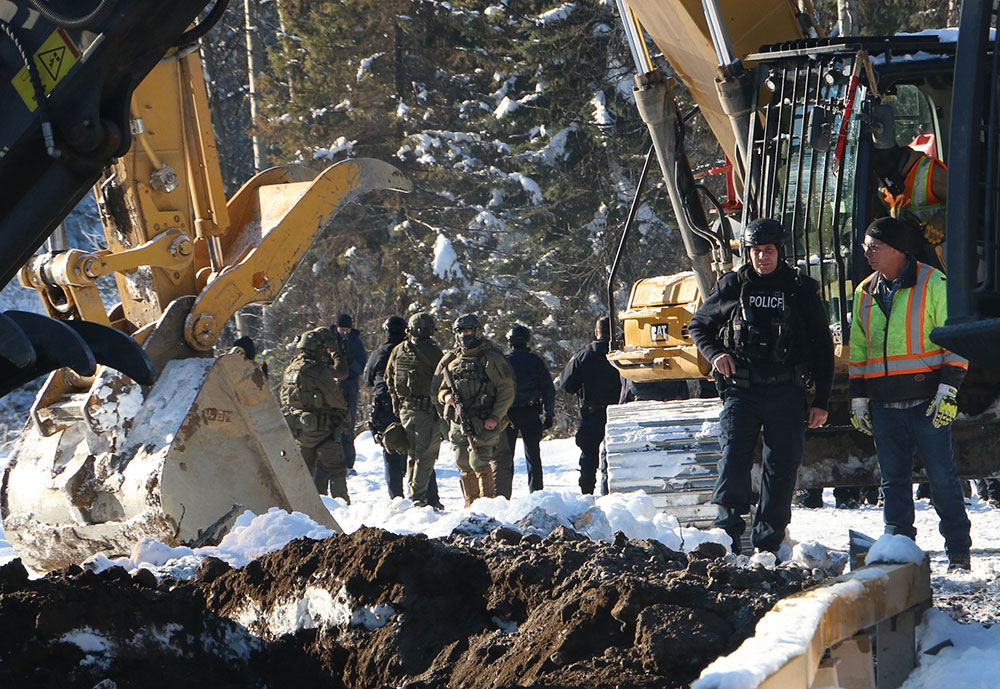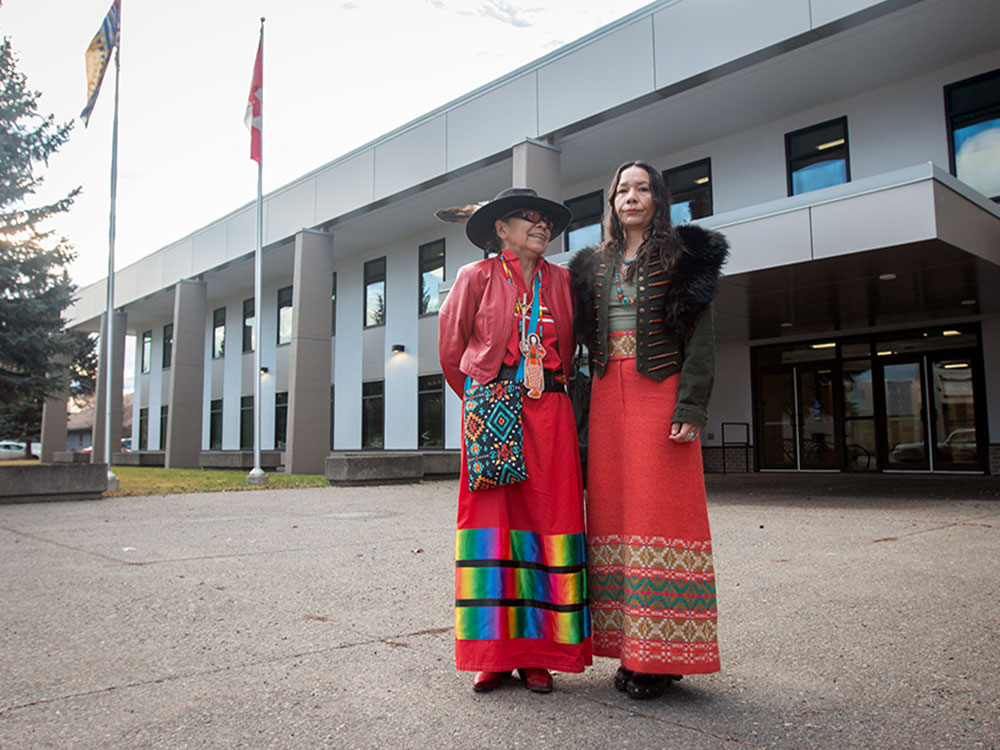There were tears and hugs in a Smithers courtroom on Wednesday morning as the first criminal trial involving an Indigenous land defender arrested in the Coastal GasLink conflict ended with a not guilty verdict.
In reaching his decision, B.C. Supreme Court Judge Michael Tammen accepted that Sabina Dennis was motivated by a desire to protect others and reach a peaceful resolution when she stepped onto a bridge where more than 50 police officers, some wearing military-style fatigues and carrying rifles, approached on the Morice Forest Service Road on Nov. 18, 2021.
He also acknowledged that the RCMP “arrived at the site with a significant show of force” as they moved to make arrests and reopen the remote resource road after it had been closed for several days by Wet’suwet’en hereditary leadership, who oppose the pipeline project.
Standing outside the courthouse following the decision, Dennis expressed gratitude and relief.
“I’m thankful to our ancestors and our spirit protectors for the strength to continue on, to create a safe space for all, and that the judge, Justice Tammen, sided with peace,” she said.
During closing arguments on Monday, defence lawyer Frances Mahon described Dennis as a “peaceful and principled Dakelh woman” who was attempting to act as peacekeeper and negotiator when she was taken into custody with more than a dozen others who were arrested the same day under a B.C. Supreme Court-issued injunction that prevents anyone from blocking access to roads or work sites used for the construction of the Coastal GasLink pipeline.
Mahon said Dennis felt “great risk” as officers with RCMP’s Community-Industry Response Group — a specialized policing unit now under investigation by Canada’s police watchdog — and Emergency Response Team advanced onto the Lamprey Creek bridge, where heavy machinery had been used to block the road. She moved onto the bridge in the hopes of bringing about a peaceful resolution based on her past experiences with police in the area, Mahon said.
“Ms. Dennis did not see risk that she would breach the injunction or bring disrespect upon the authority of the courts. The risk she saw that day was the virtual army of police coming towards her family and friends on the yintah,” Mahon said, using the Wet’suwet’en word for the nation’s traditional territory.
“The chance that she took was to try to engage with the police, welcome them peacefully onto the territory and protect the people who were there, including the police.”
But BC Prosecution Service lawyer Paul Battin argued that Dennis was not afraid as police approached the bridge that day. He said her tone was not conciliatory, she did not attempt to negotiate with police and there was “a marked difference” from her prior interactions with police in the area.
Dennis’s intention that day, Battin argued, was to violate the injunction, thereby disrespecting the court and meeting the threshold for criminal contempt.
“She came down onto the bridge even after being told that they were under arrest,” Battin told the court. “The evidence that we have of Dennis's actions that day at the bridge prove that contempt has been laid out.”

The November 2021 police action came four days after the remote Morice Forest Service Road, a resource road that heads south from Houston and provides access to a portion of the Coastal GasLink pipeline route, was closed beyond kilometre 39 by Wet’suwet’en leaders on Nov. 14. The road closure prevented the delivery of supplies to two work camps housing hundreds of pipeline employees, the company said at the time.
On Nov. 19, a day after Dennis and others were arrested on the Lamprey Creek bridge and once the road was reopened to traffic, the RCMP conducted a second raid on an encampment at a work site where Coastal GasLink was preparing to drill under the Morice River, known to the Wet’suwet’en as Wedzin Kwa.
In total, more than 30 people were taken into custody during the two-day police action, including several journalists. One journalist was released without charges on Nov. 18 while Coastal GasLink later announced it would not pursue legal action against two other journalists arrested Nov. 19.
But the following summer the BC Prosecution Service announced it would assume contempt proceedings from Coastal GasLink, which holds the civil injunction, against 19 people arrested in November 2021, marking the first criminal charges laid in the years-long dispute. Some of those who were charged have since pleaded guilty, while others await upcoming trials.
Tammen explained that contempt of court has four essential elements, including the existence of a court order, a contemnor’s knowledge of the order and intentionally violating the order.
But what distinguishes criminal contempt from civil contempt, he said, is “public defiance of the court’s process” in a way that’s meant to diminish respect for the courts. Criminal contempt requires proof that a person intentionally defied a court order in a way that would depreciate the authority of the court.
He said that Crown prosecutors had successfully proven the first three elements. But he said the “crux of the matter” hinged on Dennis’s credibility.
“I watched Ms. Dennis intently for almost two days of testimony and paid extremely careful attention to her evidence and the manner in which she delivered it,” Tammen said, adding that Dennis had impressed him as a witness.
“I would describe Ms. Dennis as soft-spoken, articulate, thoughtful, respectful and sincere. I accept Ms. Dennis’s evidence that she was, despite outward appearances, frightened as she stood on the berm on Nov. 18 and as she decided to step onto the bridge.”
Tammen also noted Dennis’s long history with the conflict, which boiled over in early 2019 following more than a decade of Wet’suwet’en opposition to pipelines through the territory. He noted that she has “blood ties” to both the Wet’suwet’en and Dakelh, or Carrier, nations and had attended meetings about the pipeline project when it was first proposed a decade ago. She had also attended court proceedings when the injunction was first issued in late 2018, Tammen said.
In January 2019, Dennis was asked by a member of the Unist’ot’en, a Wet’suwet’en house group, to act as a witness as the RCMP threatened to dismantle a barricade on the Morice road at the Lamprey Creek bridge. As police prepared to cut through the barricade using a chainsaw, Dennis alerted officers that there was a safety risk to someone embedded in the structure, Mahon told the court earlier this week.
Dennis left peacefully on that occasion when she was offered the opportunity by police, the court heard.
A year later, after Wet’suwet’en Hereditary Chiefs reaffirmed their eviction notice to Coastal GasLink and closed the road a second time, Dennis was at a temporary camp 39 kilometres down the Morice road, which had been established to shuttle supplies farther up the road.
Despite previously confirming with police that it was located outside the injunction zone, the RCMP raided the camp and arrested occupants “without any warning or attempted negotiation” in the early morning hours on Feb. 6, 2020, Mahon said. Dennis was among those taken into custody but was released the same day without charge, she added.
Mahon also described two separate occasions when Dennis acted as an intermediary between pipeline opponents and the police.
In spring 2021, Dennis was invited by members of the Gidimt’en Clan to perform a ceremony in the Morice area, Mahon said. When the RCMP arrived, Dennis spoke with officers, explained the ceremony and negotiated that the group could complete it before leaving peacefully.
That fall, just weeks before her arrest in November, Dennis interacted with RCMP Supt. Ken Floyd, gold commander of the Community-Industry Response Group, during the arrest of Wet’suwet’en Hereditary Chief Dsta’hyl. The court heard that Dennis worked with RCMP to clear the road and dismantle a temporary camp, reaching a compromise that allowed protesters to collect their belongings.
“Critically, Supt. Floyd agreed under cross-examination that Ms. Dennis was reasonable to deal with during this negotiation and in fact helped bring about a resolution to clear the road,” Mahon said, adding that the C-IRG gold commander told Dennis he may need to rely on her negotiation skills in the future.
In mid-November that year, Dennis returned to Gidimt’en Camp, located near the Lamprey Creek bridge, to attend a meeting with Wet’suwet’en leaders, the court heard. On Nov. 18, when she heard that a convoy of police vehicles, heavy machinery and tow trucks was approaching the bridge, she believed there might be opportunities for negotiation and a peaceful outcome, Mahon said.
She initially stood on a berm of overturned earth but moved onto the bridge “because of the risk that she felt from the police officers” as they advanced with police dogs and rifles, Mahon said. Mahon added that Dennis moved onto the bridge as Floyd read a warning about the injunction because she sensed an “escalating threat.”
“Her arrest was accomplished as soon as he finished reading the arrest script. There really was no opportunity to leave,” Mahon said.
Mahon added that Dennis verbally welcomed officers onto the territory and performed a tobacco ceremony to bless anyone who crossed the bridge. The group sang a traditional Mohawk peace song meant to de-escalate the situation and encircled Elders in the group in order to protect them, she said.
As police moved onto the bridge, Dennis tried unsuccessfully to make eye contact with Floyd, Mahon said. Based on her previous experience at similar police actions, she believed that she would be given an opportunity to leave.
Crown prosecutors disputed that Dennis had attempted to act as a peacemaker during the arrests or that she felt fear as police approached the Lamprey Creek bridge.
Battin argued that Dennis never called out to Floyd or made attempts to negotiate with him. He added that allowing people to leave an injunction zone is at the discretion of police, and that Dennis’s belief she could avoid charges by opting to leave the injunction zone later was false.
Battin said that Dennis did not use “a conciliatory tone” once on the bridge, instead using phrases such as “You have no authority here” and “I am not afraid of you.”
“Her words say that she is not afraid. Her tone says she is not afraid. Ms. Dennis said that she knew that the police were in charge of enforcement on the injunction and when they arrived one of the first things she says to them is that they have no authority there,” he said. “Ms. Dennis’s evidence is that she was interested in negotiating with Officer Floyd, but these words don't convey a sentiment of negotiation.”
Battin concluded during final arguments Monday that the threshold for criminal contempt had been met.
But Tammen disagreed, saying he accepted that Dennis was frightened during the interaction with police and had “summoned all the courage she could muster when she went onto the bridge in an effort to prevent force being used against those standing on the berm.”
“I accept that Ms. Dennis was initially motivated by a desire to protect those at camp and to ensure that any interaction was peaceful,” he concluded, agreeing that Dennis thought police “were willing to work with her to negotiate a peaceful resolution to a potentially volatile situation.” ![]()
Read more: Indigenous, Rights + Justice, BC Politics

















Tyee Commenting Guidelines
Comments that violate guidelines risk being deleted, and violations may result in a temporary or permanent user ban. Maintain the spirit of good conversation to stay in the discussion and be patient with moderators. Comments are reviewed regularly but not in real time.
Do:
Do not: